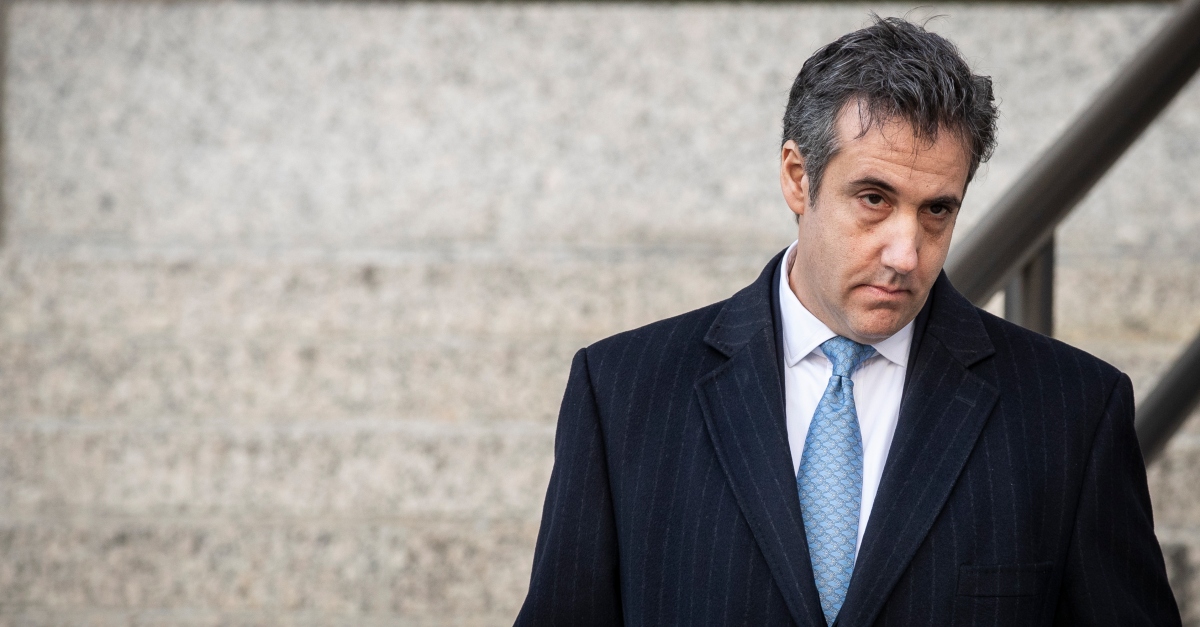
Michael Cohen may have thought he was in the clear after he postponed what was supposed to be a Feb. 7 public hearing before the House Oversight Committee, but he was promptly hit with a subpoena from the Senate Intelligence Committee. While the Senate hearing would be behind closed doors and led by Republican Sen. Richard Burr (R-N.C.) (as opposed to the Democrat-led House), Cohen would still be facing tough questions under oath.
So what if he just doesn’t answer? That’s where criminal contempt could come into play.
According to 2 U.S.C. § 192:
Every person who having been summoned as a witness by the authority of either House of Congress to give testimony … who, having appeared, refuses to answer any question pertinent to the question under inquiry, shall be deemed guilty of a misdemeanor, punishable by a fine of not more than $1,000 nor less than $100 and imprisonment in a common jail for not less than one month nor more than twelve months.
Now, it wouldn’t necessarily come to that. Before the Senate would even get a chance to vote on whether to hold Cohen in contempt, the Committee would have to vote on whether to recommend it. According to the Senate Intelligence Committee procedures, however, that wouldn’t even happen “unless and until the Committee has, upon notice to all its members, met and considered the recommendation, afforded the person an opportunity to address such contempt recommendation or subpoena enforcement proceeding either in writing or in person, and agreed by majority vote of the Committee to forward such recommendation to the Senate.”
That means that if Cohen refuses to play ball, and Committee members decided to consider a contempt charge, Cohen would then have an opportunity to respond.
If that response was not satisfactory, however, there are a few ways it could play out.
First off, the matter could go before the President of the Senate (either Vice President Mike Pence or president pro tempore Charles Grassley (R-Iowa), who could then refer the matter to a U.S. Attorney to take the case before a grand jury to consider a criminal contempt indictment. An alternative process would be for the Senate sergeant-at-arms to arrest Cohen and have him held in the Capitol jail until the end of the legislative session, but this hasn’t been done since the 1930s. Another option would be for the Senate to bring a civil action in federal court to request an injunction to compel Cohen to testify. If Cohen then failed to comply with the court order, he could face a contempt of court charge.
For those wondering whether Cohen may refuse to talk and use the excuse that Special Counsel Robert Mueller told him not to, it’s unlikely that this would work. First off, the House Judiciary and Oversight Committees weren’t satisfied when now-former FBI agent Peter Strzok used the excuse of an ongoing investigation to not answer questions, and they threatened to hold him in contempt.
Second, as CNN legal analyst Elie Honig told Law&Crime, it’s extremely unlikely that Cohen even has any sensitive information to justify such an excuse.
“Surely Mueller would have exercised due caution when meeting with Cohen and not told Cohen anything he didn’t want splashed across the newspapers,” Honig said. “In other words, while Mueller surely questioned Cohen, Mueller also could carefully control what info he gave to Cohen (ideally, none). Put another way – there’s almost no way Mueller disclosed protected / secretive / confidential grand jury information to Cohen.”
On the off chance that Cohen did try to use Mueller as an excuse not to answer questions, the Committee’s response may depend on the situation. Honig said that it wouldn’t be “a legally cognizable exception to a compulsory subpoena,” but Senators would probably be sensitive to Mueller’s investigation and not want to step on the special counsel’s toes.
What it boils down to is that Cohen better talk, or his upcoming 3-year stay in federal prison may not be the end of his problems.
Ronn Blitzer is the Senior Legal Editor of Law&Crime and a former New York City prosecutor. Follow him on Twitter @RonnBlitzer.
[Image via Drew Angerer/Getty Images]
Have a tip we should know? [email protected]